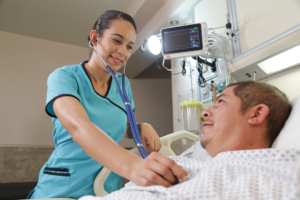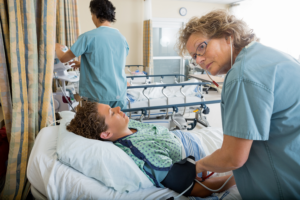
LPN to BSN Programs
By EveryNurse Staff on January 12, 2023

LPN to BSN programs are a great choice for licensed practical nurses who want to transition from practical nursing to registered nursing. Although much of the bedside care performed by LPNs and RNs may seem to overlap, registered nurses are expected to assume greater responsibility and personal accountability for their patients than LPNs. As a result, LPNs must take a significant step forward in their education and training to prepare themselves for RN roles.
If you are an LPN who is contemplating this transition, an LPN to BSN program may be the best choice for you. LPN to BSN programs allow you to use your existing education and skills to minimize the amount of time it takes to earn a BSN degree and qualify for the NCLEX-RN exam.
What Are LPN to BSN Programs?
LPN to BSN programs provide students with an opportunity to earn a Bachelor of Science in Nursing degree – one of the most respected degrees in the field of nursing – in as little as two years, rather than the usual four years of full-time study. LPN to BSN programs are able to dramatically lower the time it takes to complete your degree, without sacrificing the rigor of the program, by giving you credit for prior LPN education and experience.
A BSN degree is the most comprehensive and rigorous undergraduate nursing degree available to nursing students. BSN-educated registered nurses have the clinical judgment and broad skillset to practice nursing at a higher level of professional responsibility than LPNs. They practice with more autonomy and command a much wider range of career opportunities.
LPN to BSN Program Learning Outcomes
Graduates of LPN to BSN programs will be prepared to:
- Sit for National Council Licensure Examination (NCLEX-RN).
- Provide, safe, ethical, and competent patient care to individuals, families, and special populations across various health care settings.
- Function effectively as a member of an interdisciplinary healthcare team.
- Apply critical thinking and problem solving to enable patient advocacy, promote wellness, and ensure safe transitions in care, within professional standards of practice.
- Provide patient education and counsel about health promotion and disease prevention.
- Conduct comprehensive patient assessments and provide appropriate care in accordance with the patient’s requirements.
LPN to BSN Programs Online
Colleges and universities are increasingly adopting “blended” or “hybrid” course formats to meet the needs of a diverse population of students. A blended course involves face-to-face class sessions that are accompanied by online instruction and other virtual modules. This “blend” of traditional classroom education and online learning is growing in popularity as it provides students with the best of both worlds: an intimate and supportive learning environment on campus with the flexibility of learning when and where they choose.
Online Clinical Component
Students enrolled in LPN to BSN programs must complete several hundred hours of clinical experience in a supervised care setting in order to graduate. Whether traditional or blended, the program clinical requirements must be completed in person. This type of training cannot be done online – it needs to be completed face-to-face.
That said, many programs are using new technology to provide students with virtual clinical simulations, which allow students to practice real-world clinical skills in the comfort of their own homes. This type of educational experience benefits students by giving them a realistic environment to practice skills they have learned in the classroom. Together, the combination of virtual and face-to-face experience helps to make students more well-rounded professionals.
Helpful Links
What You Will Study
LPN to BSN programs are rigorous and comprehensive. The program curriculum goes well beyond basic competencies and contributes to a rich foundation in physical assessment, clinical judgement, patient-centered care, and leadership. Anchored by a liberal arts core, the LPN to BSN explores topics such as nursing theory, research, health promotion, and ethical and legal issues.
Specific courses vary by program but typically focus on the following areas:
Anatomy and Physiology
Along with basic sciences, LPN to BSN programs typically include anatomy and physiology courses designed to help students understand body systems, organ structures they will be caring for. This includes the study of motor skills, sensory functions, respiratory functions, circulatory functions, and endocrine systems.
Microbiology
The study of microbiology helps students understand the role that microorganisms play in health and disease. It also helps students to understand how critical it is for nurses to be aware of potential infections and how to take steps to prevent them. The goal of this course is not only to teach students about bacteria, viruses, fungi, and other microorganisms but also teach them about microbiology’s impact on disease processes.
Nursing Assessment
Students learn the specific components of nursing assessment and how to use them to provide evidence-based, patient-centered care. This course includes an overview of the nursing process as well as an exploration of the basic assessments used by nurses, such as a patient’s pain level, blood pressure readings, and medication needs. Students will also learn how to use a variety of assessment tools – both physical and psychosocial – in order to gain a better understanding of their patients’ needs and conditions.
Nutrition and Diet
Students focus on nutrition and diet in order to gain a comprehensive understanding of how food interacts with the human body. Nutritional science is closely tied to the development of healthy habits, which are vital in supporting patient health. Students learn how to provide nutritional counseling and study topics like food safety practices and the prevention of foodborne illness.
Basic Pharmacology
A course in basic pharmacology teaches students how to adhere to a variety of legal and ethical standards, along with how to prescribe and administer medications. This includes an overview of drug types, their effects on the body, appropriate dosage requirements, and how drugs affect patients’ health conditions. Additionally, students gain an understanding of prescription medication errors, drug information resources they can use in their clinical practice, and the importance of following up with patients about their medication doses.
Nursing Theory
Students will learn how to apply nursing theory to evaluate, plan, implement, and evaluate the outcomes of nursing practice. Students are introduced to many clinical models, including evidence-based practice, holistic, humanistic, health promotion, psychodynamic, and biomedical.
Nursing Research
LPN to BSN programs include courses that explore the methods of research. Students learn how to evaluate scientific literature, develop research questions, and carry out systematic reviews of existing data. These skills are important for students as they prepare to enter the professional work force.
Nursing Leadership and Management
Courses in this area are designed to give students an understanding of organizational health care policies, management systems, organizational culture, and ethical decision-making practices. Course topics include the importance of authority in healthcare settings, using data in patient care, professional ethics in healthcare settings, and employment issues related to healthcare professionals.
LPN to BSN Program Accreditation
It is essential that every student pursuing an LPN-to-BSN program be confident that they are selecting a program from a school with the proper accreditation. The Accreditation Commission for Education in Nursing (ACEN) and the Commission on Collegiate Nursing Education (CCNE) are the two primary accrediting bodies for undergraduate nursing programs in the United States. It is possible to check the accreditation status of a school or program by searching the ACEN’s website.
Accreditation ensures that programs meet national standards and exceed expectations regarding quality, excellence, and innovation. A program without accreditation is not in compliance with national standards and is not in accordance with the regulatory bodies that ensure quality of nursing programs. Students who earn a degree from a non-accredited program may not be able to pursue certain professional licensing requirements.
Additional LPN to BSN Resources
LPN to BSN Program FAQ
LPN to BSN programs are available in “blended” or “hybrid” course formats that combine face-to-face class instruction with online instruction. There are no BSN programs in any format that can be completed 100% online because all BSN programs require students to complete their clinical requirements in person.
LPNs with an active license can complete an LPN to BSN program in as little as two years, depending on how much transfer credit they receive for prior academic coursework and experience. The format of an LPN to BSN program can dramatically reduce the amount of time and cost it takes to complete your degree by waiving prerequisites or allowing you to “test-out” of certain courses by demonstrating competency in a subject.
Registered nurses earn a competitive base salary and are provided with opportunities to earn significantly more with increased education, specialty certification, and experience. In 2020, the average annual salary for RNs in the U.S. was $80,010, which is the hourly wage equivalent of $ 38.47. RNs in the top 10% of all earners reported salaries of $116,230 or higher.






